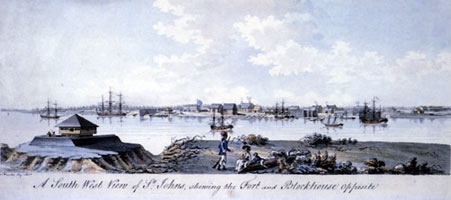After his home was invaded by a group of his Patriot neighbours and he narrowly escaped a sentence of life imprisonment for his political beliefs, Justus Sherwood served in the Loyalist forces, negotiated with Patriots on behalf of the British, was involved in secret service activities, and ultimately was a leader of Loyalist settlers in what became Upper Canada.
Sherwood was born in Newtown, Connecticut on 7 March 1747, the tenth child of John and Hannah Sherwood. He moved to Vermont about 1771 and married Sarah Bottum about 1774. They had three daughters and two sons.
He was a frontier farmer, dedicated to his family, community and king. He knew, and sympathized with, Ethan Allen and his Green Mountain Boys who carried on a long struggle to attain Vermont’s independence from New York. He did not however, support their revolutionary activities. As a result, in 1776, local Patriots raided his home, destroyed his belongings, and arrested him. After a revolutionary court condemned him to life imprisonment in Simsbury Mines in Connecticut, he escaped and fled to Bennington where his wife had gone to be with her family. Here he spoke out against the rebels who subsequently captured him and had him publicly flogged.
In 1777, he made a getaway, this time
with a group of Loyalists among whom was his cousin, Thomas. They went
to Crown Point where they met Sir Guy Carleton who assisted them in reaching
Quebec. The next year, he and Thomas joined the Queen’s Loyal Rangers
under the command of Colonel John Peters. After the regiment’s defeat
at Saratoga, Justus spent three years with his wife and family at St.
John’s, Quebec doing secret service work. Thomas was also living
at St. John’s with his family, including his son, Reuben, who enlisted
in the Loyal Rangers in 1782 at age 14. Thomas was a scout
for the British at this time, as well.
In 1780, Governor General Frederick Haldimand sent Justus back to Vermont to negotiate with Ethan Allen for the exchange of prisoners and the eventual return of Vermont to the British Empire. The British defeat at Yorktown destroyed whatever feeble hope there was for reconciliation, although Sherwood seems to have continued on good terms with the Allens.
For the next two years, Justus Sherwood continued to carry out intelligence
work in Northern New York and New England. The Treaty of Paris, which
officially brought peace, found Sherwood involved in settling Loyalists
in what was left of British North America.
He carried out an extensive inspection of the Gaspé shoreline as
far as New Brunswick and, in 1783 led a party of Loyalists to the Kingston-Bay
of Quinte area where he began the surveys of the new townships. Reuben
Sherwood was one of his assistants.
The decision to open the area along the St. Lawrence west of Montreal is a reflection of adamant opposition to any plan to locate Loyalists on the seigneuries of Quebec. Loyalists preferred settling on the new lands to the west. Thomas Sherwood’s family also settled in the new townships along the St., Lawrence. Reuben received 200 acres in Elizabeth Township as a veteran and began clearing land and building timber rafts with his father and cousin, Justus.
By 1785, Justus had installed his family on a new farm in Augusta Township, just west of present-day Prescott. By 1792, he had constructed a grist mill on one of his properties. He served as Land Commissioner for Lunenburg District and Justice of the Peace. He died in the summer of 1798 at Trois Riviéres while taking one of the timber rafts to Quebec.
Reuben served as captain of guides on the St. Lawrence during the War of 1812. In February 1813, Americans raided Brockville and captured approximately 50 men including his younger brother, Adiel, a captain in the Leeds Militia. Through trickery, Reuben was able to capture two American officers and arrange for the release of his brother and another officer in exchange for their release.
For many years, Reuben earned his living as a government surveyor. His survey records are preserved in the Archives of Ontario.
Originally published in United Empire Loyalists- Pioneers and Settlers, A Teacher’s Resource.
For further information: Fryer, Mary
Beacock, Buckskin Pimpernel – The Exploits of Justus Sherwood, Loyalist
Spy, Toronto: Dundurn Press, 1981
